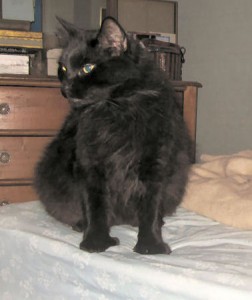A reply from Santo Lucà! Continue reading
I finally received a reply to the e-mail that I sent to Professor Lucà on May 31. In it I posed two questions: 1) Did he think that the young Theophylact, the future Pope Benedict IX, might have been educated by the Basilian monks? This would have meant that he would have been one of the very few Romans who could speak and read Greek. 2) Did he believe the legend that Benedict and his brothers retired as monks in Grottaferrata?
His answer to the first question was this:
credo proprio di no; sono i monaci ‘basiliani’ che parlano il latino!
He says that he does not believe so. There are Basilian monks who speak Latin.
I have to wonder if he understood what I was getting at. Theophylact’s family was the most prominent in central Italy. Not only was the monastery near to the family’s home in Tusculum; Theophylact’s grandfather had actually donated the land on which it was constructed. If Theophylact was not educated by the Basilians, then he must have been instructed elsewhere. Surely his family must have tried to provide him what he needed for the career that they planned for him.
I have read that he was a student of Lawrence, but Lawrence was in Montecassino for much of Theophylact’s youth, and Montecassino is much further away. In addition he became Archbishop of Amalfi in 1029, three years before Theophylact assumed the throne. So, it does not seem unreasonable to speculate whether Theophylact’s family might have taken advantage of its relationship with the monks to help groom Theophylact for his imminent career as pontiff. And if the monks did perform this service, I find it hard to believe that they did not teach him the Greek language, which they used for all of their services.
There are a few other facts that support this hypothesis. The three Tusculan popes (Benedict IX and his two uncles) had much better relations with the Greek church than either their predecessors or their successors. In fact, the Great Schism occurred in 1054 in the very first stable pontificate after Benedict’s! Furthermore, it is fairly well documented that Benedict IX and St. Bartholomew, the hegumen of the abbey, had a pretty good relationship throughout his pontificates.
The answer to the second question was:
assolutamente no!
You do not need to be a native-born Italian to figure out what that one means. I think that the legend that Benedict repented, retired, and became a Basilian monk was perpetrated by Luke, the Basilian monk who wrote the biography of St. Bartholomew. Here is what Capitani wrote about the subject in his his entry in Enciclopedia dei Papi (2000):
Le ultime considerazioni fatte circa i documenti del 1055 e del 1056, nei quali il nome di Benedetto appare ancora – e non quello di Teofilatto, come ci si sarebbe dovuti attendere, in caso di pentimento del Tuscolano – escludono ogni verosimiglianza delle notizie contenute nelle agiografie di Bartolomeo di Grottaferrata, che avrebbe operato una sorta di conversione sul “terribile” pontefice, ritiratosi in penitenza nel monastero.
Basically this says that the erstwhile pope was still using the name Benedict in official documents in 1055 and 1056, the year of his death. So, it seems very unlikely that he would have repented as stated in the hagiographies of Bartholomew of Grottaferrata. If he did not abandon his claim to the papacy, he almost certainly did not become a monk either.
I sure would like to know what did happen to him in the decade or more after he lost the papacy.




